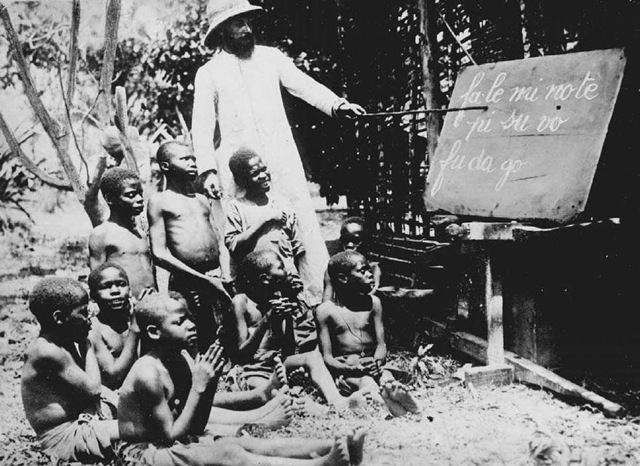At this point an old man said he had a question. "Which is this god of yours," he asked, "the goddess of the earth, the god of the sky, Amadiora or the thunderbolt, or what?" The interpreter spoke to the white man and he immediately gave his answer. "All the gods you have named are not gods at all. They are gods of deceit who tell you to kill your fellows and destroy innocent children. There is only one true God and He has the earth, the sky, you and me and all of us." "If we leave our gods and follow your god," asked another man, "who will protect us from the anger of our neglected gods and ancestors?"
This annotation is connecting to the question, "What "cracks" do you see in Igbo culture that make it receptive to missionaries?"
This section seems to be very important when the missionaries are being questioned by the members of the community. The missionaries are later trying to find their ground in the culture because no one believes that their Gods are not going to hurt the people. In a few paragraphs below, where I didn't highlight, the Igbo people think its absolutely ridiculous that God has a son but no wife. This is one of the main differences between the two cultures, and they can't really seem to grasp the concept of the other one. This is also part of the language barrier, because the Igbo people aren't taking it very seriously whenever the missionaries say "buttocks" meaning myself. It is extremely humorous to both the readers and the Igbo people but the missionaries have no idea. This could be a crack in the culture though, because though they let the missionaries into their area, they are just mocking them. Another crack is that they are so confused about the possibility of another single God that they joke about it. The missionaries seem very innocent in the fact that they just want the Igbo people to stop being paranoid about a God that may or may not be real, just like the one they are preaching. Another flaw in the Igbo peoples culture is that while some of them are poking fun at the new religion some are taking it seriously, and they refuse to recognize this. Nwoye takes the song, about the existence of the God we know, very literally and in the text it says he's "captivated." He felt relieved while the rest of his clan thought it was ridiculous. Even having one positive person lets the missionaries have confidence in staying. As the readers we know that later it was worth it and they end up bringing in more people than just Nwoye. 
